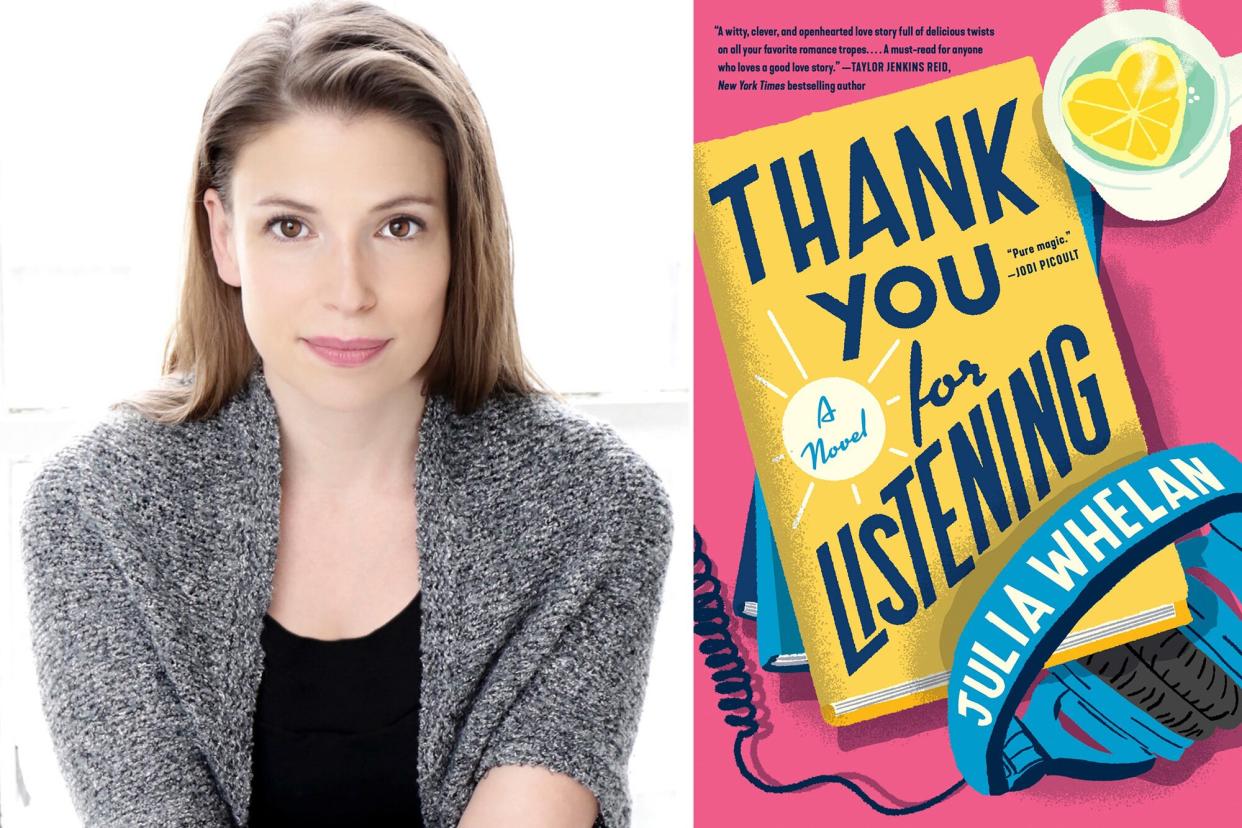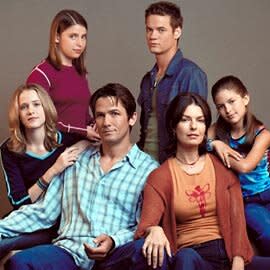How former Once and Again star Julia Whelan channeled audiobook fame into her new novel Thank You for Listening

Julia Whelan is a fan of having the last word, both in her career as an award-winning audiobook narrator and as a cocktail lover — the Last Word drink is equal parts gin, chartreuse, maraschino liqueur, and lime, and pops up a lot in her sophomore novel, Thank You for Listening. "Many Last Words were consumed during the writing of this book," she quips.
It's the perfect drink and metaphor for Whelan, who started her career as a teen actor (most notably as troubled adolescent Grace Manning on early aughts drama series Once and Again), and has channeled those acting skills into becoming one of the most sought-after audiobook narrators around (her first big break was voicing 2012's Gone Girl by Gillian Flynn).
Now, Whelan's getting the last word not only aurally, but as a writer in her own right. Her 2018 debut, My Oxford Year, earned raves, and she returns this summer with Thank You for Listening (out Aug. 2).
The book follows Sewanee Chester, an audiobook narrator edged into the profession after being forced to give up her Hollywood acting career. When Sewanee has a one-night stand with a sexy stranger while attending a Las Vegas book convention, she expects it to be a blip on her radar. But when she resurrects her old romance-recording pseudonym to narrate a novel with industry golden boy Brock McNight, the two forge an unexpected connection that sends a pile of secrets unraveling in their wake.
Whelan says that the idea to set a rom-com in the world of audiobook narration has been marinating in her brain since she first pivoted in her own career. "This idea has been percolating for probably a decade," she tells EW. "It started when I was narrating a lot of romance myself under an alias, and I was paired up in a series with a narrator who's a very good friend of mine. We were exchanging emails and text messages back and forth, covering all of the questions that were cropping up in this book, which was like, 'How are you going to say this particular word? Are you moaning through the scenes? How far are you going?' And I thought it was absolutely hilarious because it was so awkward."
The book also tackles dementia and caring for an aging relative, as Sewanee devotes herself to her beloved grandmother, slowly losing her to Alzheimer's disease. It's another parallel from Whelan's life, who used her initial audiobook earnings to care for her grandfather and step-grandmother — but to her, it was more about delving into a deeper theme in romance fiction.
"I wanted this book to play with the ideas of fantasy versus reality, which is something that the romance community grapples with all the time," she explains. "We all understand it's fantasy. We're all in on it. It's okay. But once I knew that was a theme that I wanted to play with, then it became very clear to me that there's like nothing that exemplifies that theme more than watching someone go through a separation from reality, which is Alzheimer's and dementia. And I had gone through it myself."

Kei Moreno; HarperCollins
Still, with the parallels to Whelan's own life, she runs the risk of readers assuming the story is semi-autobiographical. It's something she previously encountered with My Oxford Year, having herself spent a year as a visiting student at the prestigious British university. It's something she addresses in her author's note, and she's taken great pains to separate her heroine's feelings about narration from her own.
"I was so conscious of that fact that people would think that, that I tried very intentionally to create a character who approached the industry and came to the industry in a very different way and had more conflict about this new job than I do," she notes. "I love my job. I'm happy with it. But there's no conflict there. And that doesn't make for an interesting story."
Still, writing the novel did dredge up some complicated feelings for Whelan. She left acting and pivoted full-time to audiobooks under her own steam, while Sewanee backed into it as the result of a tragic accident. Yet Whelan says it still made her reconsider the series of decisions that led her to where she is now.
"In late 2017, as I was starting to kind of really conceive of this story and who my main character was, Me Too was happening and Hollywood was going through a reckoning," she says. "As happy as I was to not really be embedded anymore in pursuing an on-camera career, it brought up a lot of feelings. Of questioning what had really been my choice and what hadn't been my choice, Because I was someone who wouldn't put myself in situations where there could be a quid pro quo or something — and I would lose out on opportunities."
"So as happy as I was with this new direction and having more control over my life, both creatively and financially, I was still kind of resentful," she adds. "But I just couldn't do this business the way I wanted to do this business. And that's what started making me think, 'If I feel this latent, low-level of simmering resentment about that, what if it hadn't been my choice? How bad would I feel if it hadn't come from a place of empowerment, and instead, it was just something that was a circumstance you had to deal with?"

Once and Again: Norman Jean Roy Julia Whelan (top left) and the cast of Once and Again
Above all though, Whelan wanted to write a love letter to her profession and the romance genre. It can be found in her epigraphs where she juxtaposes sassy quotes from her fictional author, June French, against the likes of Tolstoy and Hemingway. "There's a public perception of romance novels and romance novelists that is at odds with what I have personally found to be true," she says. "Which is that these women are so smart. They're such good business women. They are very progressive, and thoughtful, and don't take any s--t. And I just wanted to have that represented on the page — someone, who if she were taken seriously, her quotes could stand up against Tolstoy."
She also took the opportunity to address a common misconception about audiobook narration: that there are multiple people doing all the voices a reader hears. "It's usually one person doing the performance," she notes. "So many people ask me who my co-narrator was on something, or who's coming in to do the guy voice. And I'm like, 'I don't know what to tell you.' It's at the beginning of the book; it says who's narrating it."
Though she's still maintaining a robust recording schedule and career as a narrator (she did the audiobook for Thank You for Listening, naturally), Whelan says she's eager to continue writing. She's even pondering taking the book that Sewanee and Brock record in this novel, Casanova, and making it real.
It'd be yet another way to get the last word.
Related content:

 Yahoo News
Yahoo News 
